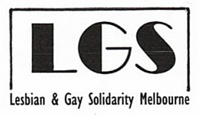


Dear Board Members,
It's some time since the ABC announced its approval of a series of measures to develop further the implementation of its equal employment opportunity plan and I apologise for being so late with my congratulations.
I am heartened though by the fact that the ABC has not backed down on those publicised measures despite some adverse and unsound criticism.
In particular, I'm impressed by certain aspects of the policy, namely, that places will be set aside on training courses for members of groups severely disadvantaged in employment and the recruitment of women in designations in which they are acutely under-represented.
Because of my special interest and personal involvement in gay movement politics, I am delighted that the ABC has recognised and accorded defacto homosexual relationships equal status with heterosexual relationships.
Although I am aware that some employers already operate similar non-discriminatory policies regarding their gay employees, they have remained remarkably closeted about their policies. I'm pleased the ABC is prepared to be open about its policy. Hopefully, its openness will have a positive effect on those and other employers.
Nevertheless, I'm still disappointed and sometimes dismayed by tendencies in the newsroom to reinforce dubious sensational aspects, indulged in by other media, when reporting some gay-related stories.
However, I offer my sincere congratulations in regards to the Board's actions to further the equal employment opportunity plan.
Kendall Lovett
The 1982 Macquarie Dictionary defines the word “Victim” as follows:
victim, n. 1. a sufferer from any destructive, injurious, or adverse action or agency: VICTIMS OF DISEASE OR OPPRESSION.
The other definitions are not relevant to the argument which follows, and so will not be included in the discussion.
When gay men in the USA started getting diseases in the early 1980s which had previously been unknown in young, healthy males, diseases such as Kaposi’s Sarcoma (KS), a type of cancer, and Pneumocystis Carinii Pneumonia (PCP), and dying from these diseases soon afterwards, the doctors were puzzled as to the cause of the illnesses. The Gay Plague, or Gay Related Immune Deficiency (GRID) became useful labels for the media to attach to the homosexual community and particularly the lifestyles of a group of people who did not conform to the mainstream of society, the “norm” of the family.
As time went on, and intravenous drug users also came down with similar symptoms and diseases, the media were able to give similar sorts of labels to such “sub-groups” in the community – after all, their lifestyles were pretty questionable as well, were they not?
The picture changed somewhat when people who had had blood transfusions were also stricken with some of the related diseases, which by then had been developed from what the Americans called HTLV 3 and the French called LAV for the virus causing the disease, now known as Acquired Immune Deficiency Syndrome (AIDS).
The media now started having a field day. Although all those people were “victims” of the disease, some had acquired it innocently from Blood transfusions, and others were getting it by being guilty of a lifestyle such as homosexuality or IV drug use.
It was thus in the late 1980s that the word “victim” in the above context became objectionable. It is now necessary to quote from a few publications to explain what was happening with the word.
The first quotation comes from a book which is from the Kinsey Institute Series Vol. IV and is called AIDS and SEX: An Integrated Biomedical and Biobehavioral Approach, Eds Bruce Voeller, June Machover Reinisch, Michael Gottlieb (Oxford University Press, London 1990). Chapter 13 is by Marlene Cimons and is called AIDS: Media Coverage and Responsibility. On page 226 she writes as follows:
“The word “victim” is another example. Initially I thought it a very appropriate word to describe someone with AIDS: an innocent person struck by a potentially fatal disease he or she did not deserve – and powerless to do anything about it. That sounds like a victim to me. My feelings have changed since then, mostly because the term is so offensive to the people I write about. I respect their feelings. Therefore, I don’t use the word.
But it has been very hard to communicate this to headline writers. It has been many, many years since I have written a headline, but I do recall the frustration of making words fit. “Victim”, I guess must have exactly the right number of letters. I’m sympathetic to that kind of problem. Yet, I have managed to write thousands of words about Jeff Mullican and Chip Schooley without using the word “victim” once. I thought the headline writers could surely find another word to describe my protagonist. But the headlines, over and over again, call him a victim.
Furthermore, I fail to understand the resistance I encounter every time I suggest we should try to find an alternative word – such as “patient” – because the term “victim” offends people. I don’t think it hurts us to be responsive to the people we cover, especially since we are dealing here with a national tragedy. But the arbiters of style are stubborn. They insist that “victim” is appropriate. I’m sure the same thing happened when blacks began complaining about the use of the term “Negro”.
“Epidemic” was another word I had trouble with in the beginning. There was the time when an editor – after 12,000 people had become ill – questioned my use of the term “epidemic” to describe what was happening.
“Couldn’t we call it an outbreak, “he said”. “I don’t know anyone who has this disease – do you?”
At the time, I didn’t. But I do now. And within the next five years, almost every American will know someone who has AIDS. No one quibbles with my use of the word “epidemic” anymore.”
This other word, epidemic, sidetracks the main thrust of my discussion but it has some relevance in the argument. Although the above was written in the USA, the same situations are occurring here and now in Sydney, Australia, in 1993. I recently contacted a professor who had written a journal article about AIDS and drugs, during the course of which he used the expression AIDS “victim”. I wrote to him and he responded by a phone call during the course of which he used the expression AIDS “victim”. I wrote to him and he responded by a phone call during which he promised to write back – but hasn’t - and in the course of our discussion he said he would not use the word “victim” again although he disagreed with me, and he also said that what was taking place with AIDS was NOT an epidemic!
The next quotation comes from another American book, The Social Context of AIDS, eds. Joan Huber, Beth E. Schnieder, Published by Sage Publications (Newbury Park, California, 1992). In a chapter on Treatment and Policy, Barbara B. Sosnowitz and David R. Kovacs write on page 133 as follows:
“A second factor affecting the provision of service to PWAs (People with AIDS) is the concept of the individual as responsible for contracting the disease. There has been a general tendency to health providers to “blame the victim,” suggesting patients did not follow regimes or seek medical care soon enough (Crawford 1986; Knowles 1986), and in periods of cost-cutting, persons with an illness are accused of not paying attention to public health warnings, relying too heavily on medical services, and not using their own resources sufficiently (Crawford 1986). Some of the practices of homosexual men and IV-drug-using persons may result in the spread of HIV. These practices are seen as deviant or morally reprehensible by the majority of Americans (Levitt and Klassen 1979). This has resulted in a tendency to cast the PWA as deserving or having brought about his or her fate (Patton 1985). This willingness to ascribe guilt or blame has become complicated by the spread of AIDS to haemophiliac and pediatric populations. In response to this, the popular press has employed the term “innocent victim” in referring to these two newer risk groups. By comparison, gays and IV drug users would be labelled “guilty” or perhaps deserving victims. This continued moral enshroudment of the AIDS epidemic poses problems for all those associated with the disease, including the non-professional caregiver (Sosnowitz and Appleby 1988).”
In Australia, and certainly in Sydney, the same situation exists and has existed, for some considerable time. It is obviously very difficult to monitor all the media with limited resources, but two of the organisations locally who have been singularly unresponsive and unsympathetic have been the Australian Broadcasting Corporation and the Sydney Morning Herald. The Guardian Weekly, which is now printed locally, falls into the same category as the two previously mentioned. One does not expect better from most of the other media, which are basically at gutter level but what needs to be singled out in all of this plethora of disasters is the television station Special Broadcasting Service (SBS). That body has always responded positively and sympathetically when it has been pointed out that they have used the word AIDS “victim”, and they have endeavoured to ensure that it has not been repeated, with a great measure of success.
In 1990 ACT UP Sydney was formed. The AIDS Coalition to Unleash Power was formed in New York in 1987 by Larry Kramer, a writer who had become a gay activist when he found that many friends and people he knew were dying of this new disease AIDS, and the responses from most areas of American officialdom were non-existent, with a few notable exceptions. He formed ACT UP as a diresct action pressure group to pressure government and pharmaceutical drug companies to start doing something in what had clearly reached epidemic proportions. From New York, chapters were formed in other cities and countries to do the same sorts of things.
One of the early acts in Sydney by ACT UP was to draw up a list of AIDS buzzwords, and this list was widely distributed to the media. The response was generally what was to be expected – the list of words was ignored. Two of the expressions on the list are AIDS victims and Innocent victims.
In 1991 the New South Wales government set up a parliamentary inquiry to deal with compensation claims from people with medically acquired AIDS. One of the members of the inquiry, a member of the NSW Upper House was one of those who were active in promoting a “them” and “us” mentality with innocent and guilty.
On 14 August 1991, ACT UP, in an open letter, wrote about a fax which had been sent to this parliamentarian, “ACT UP/Sydney demands that you retract and apologise for the statements you have made against intravenous drug users and gay men. Your statements have only helped to encourage the ignorance surrounding issues of HIV and AIDS. In particular, you are reinforcing the concept of “innocence” vs “guilt”. All people with HIV or AIDS are innocent. All people with HIV or AIDS deserve adequate health care. ACT UP is watching you.”
The ACT UP Sydney Newsletter, LOWDOWN, published the following article in its issue 7 – OCTOBER 1991:
“INNOCENTLY ACQUIRED HIV………
The vile report from the NSW Parliament’s inquiry into medically acquired HIV is finally out. As predicted, a majority (just barely: Fred Nile, Franca Arena, Marlene Goldsmith, Doug Moppett and John Ryan) of the Committee recommends $10.27 million to be given to people with medically acquired HIV. A minority (Ann Symonds, Helen Sham-Lo, Liz Kirkby, Keith Enderbury) of the committee has decided against such a payout, claiming (rightly!) that it would reinforce the “innocent victims versus guilty faggots and junkies” dichotomy. However, both the majority and the minority agree that health and welfare services for all people with HIV are inadequate, and have made some vague suggestions to improve them.
The majority report (poor thing……..) is finding itself condemned from all sides: ACT UP Sydney, ACON and people with medically acquired HIV. ACT UP Sydney has called the report “bigotry masquerading as scholarly inquiry” because it attempts to raise the standards of care for ONLY people with medically acquired HIV, thereby ignoring the vast majority of people with HIV. However, people with medically acquired are condemning the report because they think it doesn’t recommend ENOUGH money”.
The publication of this report, and the media response, was, of course, full of the “innocent victim” statement with the implied “guilty victim” connotation.
As a grand finale, the New South Wales Anti-Discrimination Board published the results of an inquiry into HIV and AIDS related discrimination – an inquiry which only occurred because of pressure form ACT UP Sydney and other AIDS pressure groups – on 24 April 1992. It should be noted that, despite assurances from the current NSW Attorney General at a gay and lesbian rally at the end of 1992 that the report would be presented to Parliament at the next session early in 1993 for discussion and implementation of the recommendations that, at the date of writing (May 1993) nothing has been done AT ALL despite the urgency of most of the matters raised in the report.
In a section of the report AREAS OF DISCRIMINATION on pages 16-18, the following was written:
“Discrimination against people who have or are assumed to have HIV or AIDS is pervasive in society; it occurs in almost every area of life. This report focuses on those areas in which discrimination has most often been reported, or in which it generally has most impact on those affected by it.
MEDIAMedia coverage of HIV and AIDS tends to focus, not unexpectedly, on the sensational, the odd, and the controversial. People with HIV and AIDS tend to be portrayed when they are behaving in socially objectionable ways, are being harassed or victimised, or, in the case of those who are portrayed by the media as INNOCENT VICTIMS, are terminally ill and dying.
There are very few media representations of people with HIV and AIDS living normal lives, working, relaxing, shopping or socializing. Understandably, the media would probably find such situations of little interest.
A major matter of concern expressed by individuals and groups representing people living with HIV and AIDS relates to the LANGUAGE used by the media.
This does not refer only to those media which have chosen, presumably deliberately, to adopt offensive and derogatory terms in referring to some groups (notably gay men, drug users and sex workers) but even to those media which appear eager to be sensitive and objective in their representation.
Making distinctions between INNOCENT VICTIMS and others (presumably GUILTY VICTIMS) causes distress, is inaccurate and divisive. The only people who could be described as “guilty” would be those who consciously set out to become infected. Those who, whether by drug use, sexual relationships or blood transfusion became infected without knowing that the risk existed are equally innocent.
It is significant that the media rarely, if ever, use terms attributing guilt to those who are injured or acquire illness in socially more acceptable ways than homosexual relationships or drug use, such as alcohol related liver disease, tobacco related lung disease, or medical conditions resulting from over-eating.
Even when endeavouring to be sensitive, some media persist in causing offence and distress to people living with HIV and AIDS by the use of the term VICTIMS. Given that this issue has been raised repeatedly, it is difficult to understand why it is not possible for a term like PEOPLE WITH AIDS or (as is preferred by many groups) PEOPLE LIVING WITH AIDS to be used.
Derogatory terms are usually reserved for stigmatised groups. Thus the media will refer to an AIDS INFECTED PROSTITUTE, but not to an AIDS INFECTED MOTHER OF THREE. The use of language to stigmatise and attribute blame positively promotes prejudice and discrimination.
THE INQUIRY CONCLUDES that the media have a central role in determining public attitudes to HIV infection and to AIDS. The media can encourage positive community responses or they can encourage and legitimise discrimination.
The continuing representation of people living with HIV and AIDS as either victims or villains is unhelpful; it may also discourage those who may be at risk of infection from seeking appropriate medical and counselling advice. Instead, concentration of media attention on the viral infection rather than on perceived deviant behaviour would promote the best outcomes and greater community harmony.
The enforcement of existing professional ethical standards among journalists is to be encouraged. The AUSTRALIAN PRESS COUNCIL does not have a good reputation within those minority groups most often affected by HIV; it is widely assumed that the Council is simply an agent of the media proprietors with no interest in protecting the rights of minority groups.
THE INQUIRY RECOMMENDS:12. GUIDELINES ON APPROPRIATE MEANS OF REPORTING HIV AND AIDS RELATED MATTERS SHOULD BE DEVELOPED AND ADOPTED BY A MEETING OF THE ANTI-DISCRIMINATION BOARD WITH ALL PEAK MEDIA GROUPS. SUCH GUIDELINES SHOULD PROMOTE ACCURACY AND GENERALLY SHOULD PROHIBIT THE VIOLATION OF RIGHTS TO PRIVACY AND CONFIDENTIALITY.
TIME: WITHIN SIX MONTHS OF THE NSW GOVERNMENT’S ACCEPTANCE OF THIS REPORT.”
A few paragraphs have been omitted from the above section because they are somewhat irrelevant to the topic under discussion.
Two paragraphs on page 77 of the report are relevant:
“Insofar as discrimination against people with HIV and AIDS is pervasive and extensive throughout society, it should be addressed both generally and, where the discrimination is based on pre-existing prejudice against people who have or are assumed to have HIV or AIDS, specifically in terms of those prejudices. But it is vitally important that attempts to categorise people with HIV and AIDS into those who are “innocent” and those who are “guilty” be avoided.
Such categorisation positively promotes prejudice and discrimination, and encourages, even if only indirectly, the vilification of those who are blamed as “guilty”. All people who have or who may be assumed to have HIV or AIDS are entitled to live without facing prejudice and discrimination.”
Despite all attempts, the use of the words “AIDS victim” continues. The gay media is not without blame, but, when it has been pointed out to them, they have responded positively. Like all wars, some of the battles may have been won, but the war is not yet over.
There are times when semantics and pedantry have to be considered very seriously in the HIV/AIDS context.
Mannie De SaxeI wrote the above on Friday 7 MAY 1993. The next day, Saturday 8 MAY, the NSW Attorney General was present at a forum on HIV/AIDS discrimination at Heffron Hall (inner Sydney) to announce to the community that legislation was being announced by the State Government that day. Vilifying homosexuals will be a crime and it will be illegal to discriminate against people with HIV and AIDS. The changes are some of the 74 recommendations contained in the Anti-Discrimination Board report on HIV and AIDS-related violence released, as stated earlier, on 24 APRIL 1993.
The media were well represented at the forum, all five Sydney television channels being there as well as radio and newspaper journalists. Channel Nine’s report was well presented in its news bulletin at 6pm that night, but marred a good presentation by announcing at the beginning that the legislation was in relation to AIDS “victims”.
The professor I referred to in the article wrote to me on 11 MAY confirming what he had said before about the use of the word VICTIM, but believes that this is an exercise in sematic fastidiousness. However, at the end of his letter, in a PS, he states that he agrees about “INNOCENT VICTIMS”.
I believe that this proves the points I was making in the article, despite his contention in his letter that he believes that this issue tends to divert one from the serious issues.
Not so! The serious issue include discrimination against gay men who are HIV positive on two grounds:
1) because they are homosexualsThis all comes back to blaming the “VICTIM” for the disease because of his lifestyle. This of course also includes intravenous drug users and sex workers.
If nothing else has occurred with my anti-victim campaign, it has aroused a certain amount of discussion which not only is not a diversion, but helps to focus on all the other areas of discrimination taking place in the community, not least from medical practitioners and other health workers who will not treat people who are living with HIV/AIDS.
Fred Nile has introduced a bill which may soon be put before the NSW Parliament. The bill is called the PUBLIC HOSPITALS (CONSCIENTIOUS OBJECTION) BILL 1992 NSW.
It is clear that health care workers uncomfortable with treating PLWHAs already find ways to avoid it, despite pre-existing anti-discrimination policies and legislation. The bill would give this fear a respectable legalised cloak, in allowing conscientious objection to be used as a pretext for other (often discriminatory) objections. (Bloom,1993, National AIDS Bulletin, Vol.7 No.4)
It is to be hoped that the Anti-Discrimination Bill with which the Attorney General is now involved will supersede any horrors which Nile’s bill will encompass. It is also to be hoped that the Nile bill, if introduced, will be soundly defeated!
Sydney, 21 MAY 1993.
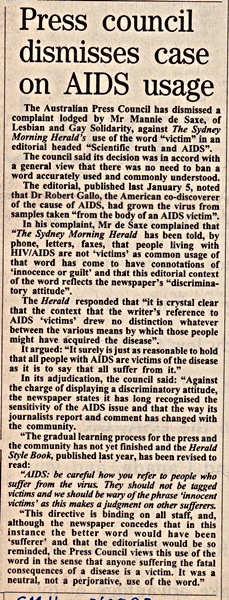
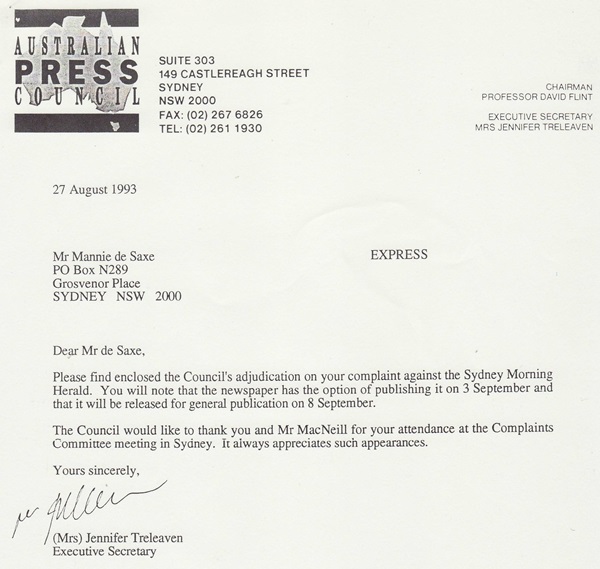
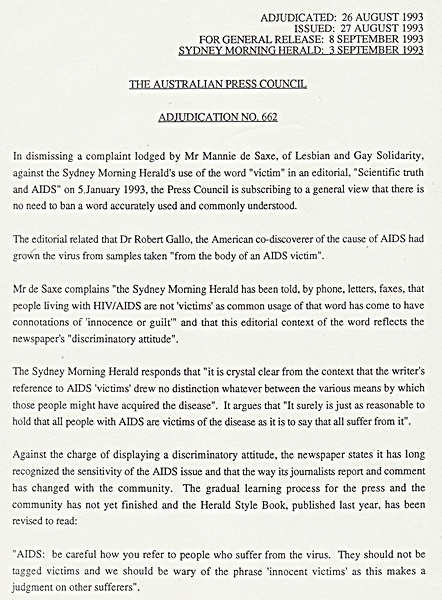
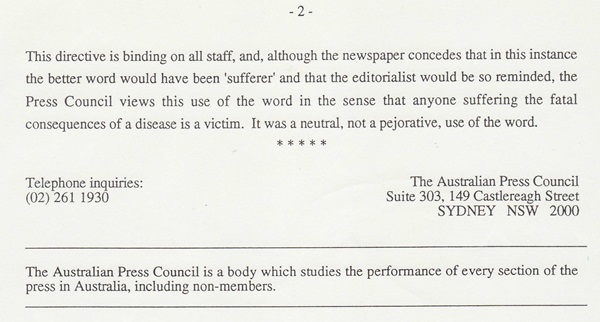

This video cames from Antony Loewenstein's Blog - the interview took place in Berlin.
3 JULY 2014
How can Victoria's First Nations have any faith in the Andrews Government's treaty negotiations when they treat traditional owners such as the Djab Wurrung so flippantly. 'We'll arrest you if you don't shut up' or words to that effect.
After more than two years seeking a mutually acceptable route change for the planned duplication of the Western Highway into a freeway, the Andrews government has told the Djab Wurrung there will be no change to the road route.
The freeway will destroy sacred cultural sites and hundreds of tall eucalypt trees to save a few minutes' driving time between Melbourne and Adelaide. Some of these trees may be 800 years old. They are Djab Wurrung birthing trees and connect culture and language with the natural environment. Once cut down, they cannot be retrieved except in the memories of the old people. It's an appalling situation and needs better understanding by the government.
Ken Lovett, Preston
Kendall Lovett submitted this letter to The Age - INDEPENDENT - ALWAYS - under the heading "NBN needs to help us working from home" and The Age letters editor decided that he/she knew best. The Age letter appears below the original letter.
The COVID-19 (Coronavirus) has highlighted the need for an NBN that is adequately equipped to facilitate telehealth, tele-education and teleworking.
We need a better digital network for the current crisis --the pandemic as well as the floods and bush fires which preceded it.
According to Laurie Patton, former Internet Australia executive director, the federal government should immediately fund the NBN company to employ suitably qualified people being retrenched, train them and deploy them to start upgrading the FTTN (copper wire) connections so that everyone has access to fast broadband.
That would be a step in the right direction now and help working people at home during the pandemic while fixing an underlying flaw that limits the effectiveness of the NBN.
Signed: Kendall Lovett.COVID-19 has highlighted the need for an NBN that is adequately equipped to facilitate telehealth, tele-education and teleworking.
We need a better digital network for the crisis – the pandemic as well as the floods and bushfires which preceded it.
According to Laurie Patton, former Internet Australia executive director, the federal government should immediately fund the NBN company to employ suitably qualified people being retrenched, train them and deploy them to start upgrading the FTTN (copper wire) connections so that everyone has access to fast broadband.
Kendall Lovett, Preston
Our federal government needs to heed former High Court judge, Mary Gaudron, who told the media (front page 02.04.20) that Canberra adopt New Zealand’s approach and set up an all-party bipartisan select committee to provide extra scrutiny of its epidemic responses.
Gaudron said that it was to ensure accountability and to preserve our democratic principles. She was speaking as a member of a group of six ex-judges convened by the Australia Institute whose executive director Ben Oquist indicated that Australia was in a health crisis and an economic crisis and “we’d like to see if we can avoid a crisis of democracy as well.”
It seems that these six judges recognise that the Australian Government has a national cabinet with no statutory or constitutional foundation making decisions affecting us all now and for many months and perhaps even years so we need the New Zealand approach.
A great many of us probably agree and urge extra scrutiny of the Coalition as we face the longest shutdown of Parliament on record.

Australia Post is looking at slashing letter deliveries to once a week (The Age 14.04.2020). It may well lose up to $426 million by 2021 but that’s because it has been mismanaged according to the 2019 review. It’s a public service and despite the privatising it’s meant to serve the people. It has already reduced letter collection to a twelve noon pickup Monday to Friday and 3pm on Sundays and none on public holidays.
Nevertheless, Australia Post needs to re-think the huge payouts to its executives and the regular increases on deliveries to letters and parcels.
(The following paragraph was NOT published by The Age)
And it won’t be alone. The government’s lockdown is going to make business houses that still exist when the coronavirus pandemic is finally over, the banks and big business will face re-starting from rock-bottom. No more huge payouts to their executives and the rich dividend hunters and company shareholders. Like it or not.

Mannie De Saxe also has a personal web site, which may be found by clicking on the link: RED JOS HUMAN RIGHTS ACTIVISM
Mannie's blogs may be accessed by clicking on to the following links:
MannieBlog (from 1 August 2003 to 31 December 2005)
Activist Kicks Backs - Blognow archive re-housed - 2005-2009
RED JOS BLOGSPOT (from January 2009 onwards)
RED JOS BLOGSPOT ALPHABETICAL INDEX

Page created 28 JUNE 2014 and updated 29 APRIL 2020
PAGE 182